|
Posted by Romy the Cat on
07-26-2009
|
|
fiogf49gjkf0d
Probably not one subject among horn enthusiasts does not arouse as much fantasies as midbass horns. This subject in one way or another was discussed at my site (look for the linked threads) but I would light look at the subject of the Midbass horns from a different perspective – from the Real Estate perspective.
First I need to define what I am taking about. I recognize 3 type of basshorns : the lowbass, midbass and upperbass. The upperbass horns are the horns from 90-120Hz. They are characterized that they can still work from the time-aligned position with MF in near filed. The midbass horns are 40-60Hz horn. They are characterized by setting reference level of playback softness. And the last one are - the lowbass horns – sub 30Hz. They are characterized by driving the illusionary imagination of people who have little understanding of want they do – I do not believe in the lower bass horns. Also, it would be worth to mention that taking about horns I mean the properly designed horns, not the direct radiators with “wings” as most of Audio Morons ™ sell themselves as “horns”. I am taking about the situation where anechoicly the bottom knee of the horns delivered at least with 6dB by the equalization of the horn…
The reason why I decided to talk about is because I decided to move from my currant place – there is a multitude of business, social, financial and other reasons why. I love my currant place – I live here form 12 years but it is a time to move on. BTW, if you are not an Audio Moron™ and still would like to catch in my old place what was done there and to learn “how Sound might be: in accordance to my view then you might still catch me unit I move, I promise that it will be educational. I anticipate that within a few months I will be gone from here…
Now, I do not have a place to move at this point and I purely conceptualizing what I what. Of course my audio inclinations do not dictate my requirement to my future home but they are a part of it and I obviously do consider them. Still this thread is not about the Real Estate but about audio. There is a very-very high probability that moving in a new larger listening room I will be willing to pursue a pair of midbass horns, probably 45-50Hz. So, I am trying to conceptualize what kind horns they might be if I have no Real Estate restrictions of any kind. The more I think about it the more I feel that it is not so simple subject to think.
I need to preface saying that I most likely know about midbass horns all that you know. I also have very specific objectives:
1) A single 15” driver per horn
2) 7”-8” throat, 40-50Hz horn
3) Horn is straight or with a single curve (not bend but juts a curve)
4) Driver in time-aligned position with MF
5) Very solid construction of each horn, preferably masonry.
6) Both midbass horns are invisible in listening room.
So, I am looking for an inspiration what I might be and how it might be accomplished. Feel free to propose any absurd idea – this is the place for them.
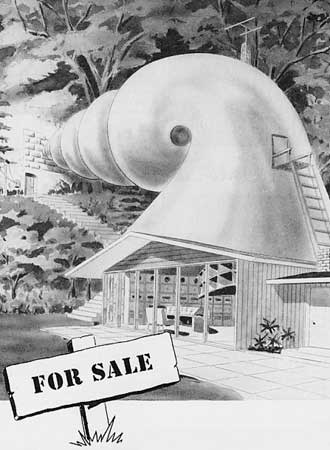
In addition to that I most likely know about the horns what you do I most likely have see most of the horns installations out there and I have to admit that I do not like any of them. I would like to do it completely differently as I have advantage to start from Real Estate. My current leading idea is to get a house that is called raised ranch with a large 800-900 sq feet living room. The raised ranches have basements where white trashes usually build bars. Those basements usually have 8”-9” ceilings – exactly the length of my 40-50Hz horn. So, hypothetically I might have two vertically arranged midbass hyperbolic of even conical horns with drivers sitting on the basement floor and the mouth at the level of the living room floor, covered with the walking screens, similar to those that we in city’s walkways above the subway holes. This is my leading idea so far but I also invasion some theoretical problem with it. So, I still am thinking and still working to purify my hypothetic design.
The best midbass I ever heard was from a corner-loaded Vitavox horn but it was an superbly accident that hardly even happen again. The most properly positioned and very well sounding midbass horn that I witness was in NH installation of Bill Gaw – it was 50Hs, time aligned very properly arranged in playback and the rest. It did not have all that I would like to have from midbass but it did not screw up sound as most of other midbass horns do and it was very good. However, in Bill ‘s case it was a dedicated room – I do not like dedicated rooms conceptually I world like my midbass horn (if I go for it) to be very non-conspicuous in a normal living room. So, if anyone has any inspiring ideas, what are more eleven then headphone-positioned midbass in the walls them feel free to tip me.

Rgs, Romy the Cat
|
|
|
|
Posted by Paul S on
07-26-2009
|
|
fiogf49gjkf0d You say you want at least two giant, solid rooms (for the horns and for listening), and enough acoustic isolation to crank it up...
The only other option seems to be using SOLID walls, floors, and/or ceilings as "part of the horns"; but this still requires the sort of space and isolation that typically come at a premium in the city.
So, are we talking about the 'burbs, here?!?
Best regards,
Paul S
|
|
|
|
Posted by jessie.dazzle on
07-27-2009
|
|
fiogf49gjkf0d In considering integration of my own mid-bass horns, and how I'd ideally like to do it, I too passed by the underground, up-firing solution, and very much like this approach. I do however have a preference for inverting the concept, resulting in a down-firing, ceiling-mounted arrangement, having the mid-bass horns installed on the upper level. This approach offers the following advantages :
1) You could stick with a solid, non suspended ground floor (no basement) for the main horns and all equipment.
2) Finances permitting, you could do this in one of the Boston lofts
A) Industrial construction will likely have masonry walls
B) You'd still be in the city
3) You wouldn't need any grills to walk on (no dirt or drinks spilling down onto drivers).
4) In the event of a flood/broken pipe, your drivers will stay dry.
The only disadvantage I can imagine is that you'd unlikely go with masonry construction for mid-bass horns located on an upper level, but could still go very solid if using a braced, fiber reinforced approached.
In either case (down-firing or up-firing), the mid-bass horns would be firing at an intersecting angle to the firing axis of the MF/HF horns, and could be located anywhere between the MF/HF horns and the listening point, such that drivers of all horns find themselves at exactly the same distance from the listener's ears.
Below are some images I made while thinking about all this :
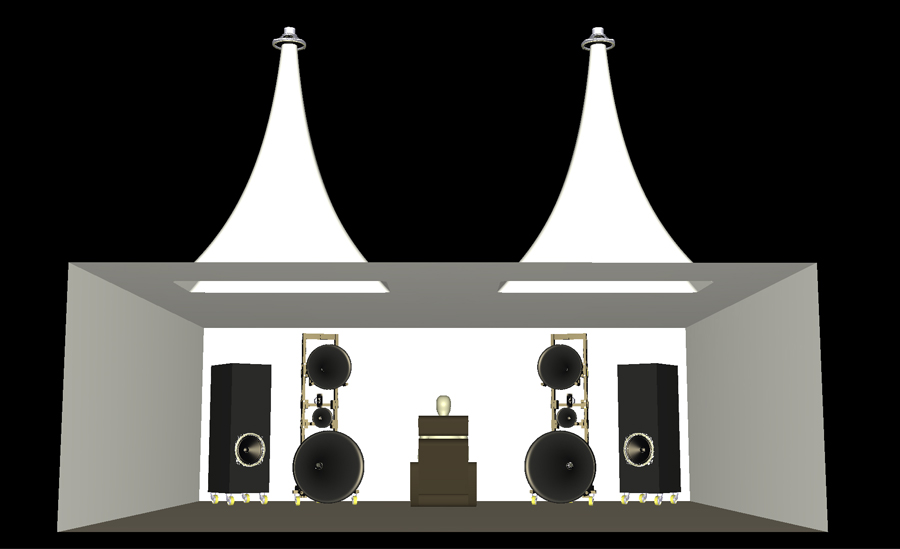
Above : View from behind listener, at ear-level
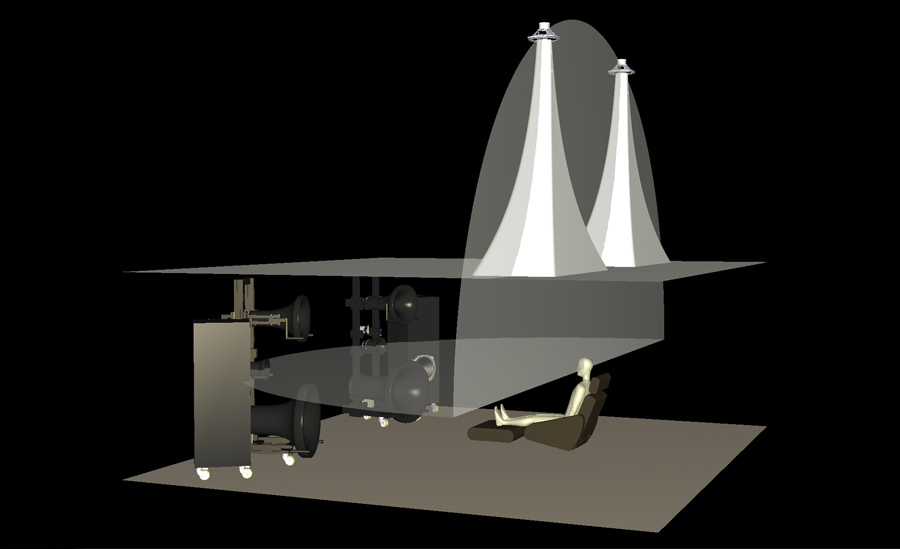
Above : Mid-bass horns firing at 90° to firing axis of MF/HF horns.
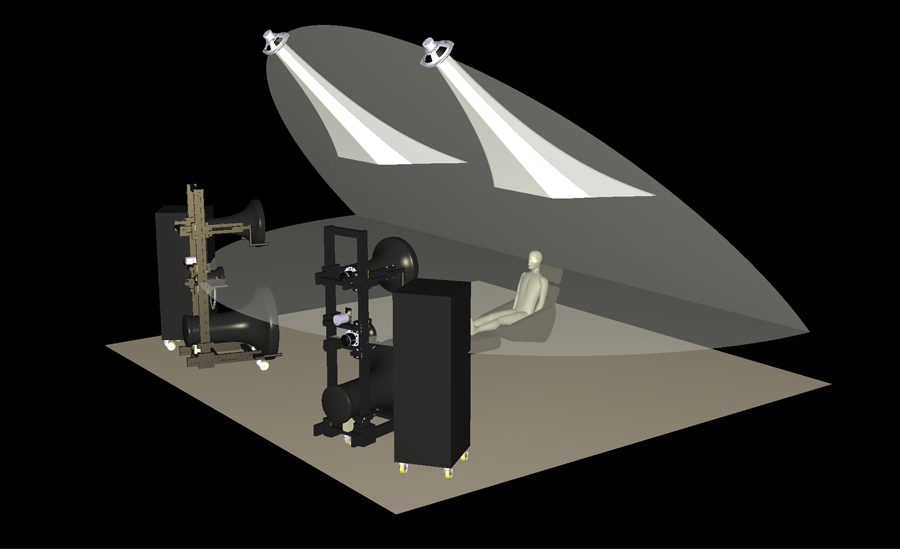
Above : Mid-bass horns angled at 45° to firing axis of MF/HF horns.
jd*
|
|
|
|
Posted by Romy the Cat on
07-27-2009
|
|
fiogf49gjkf0d
Yes, it is certain in what I proposed there is majored disadvantage of having a suspended floor. A suspended is like a bad turntable – no matter what you do you would never be able to get proper lower octave. The idea to have horn firing from roof is fine but in most of jurisdictions I think it will be prohibitive to build such a thing above roof. I need to check about it. To hide he horn in the living space is impossible of courses but in case of basement it does not take any useful space, which is not the case of ceiling firing horn.
A good idea might be using a “J” horn from both side wall, were the long horn tail runs parallel to the wall. The bitch in all of it I see that there is absolutely no way to predict what you are getting into until the things is build. Even if the things is built then you might recognize that that peaks of the response upon which you would like to capitalize might be located not in the location of your targeted listening spot and all you desires with proper time-alignment might go to a toilet. So, it is opposable to make the thing “movable”? I do not think so. I think the most sensible to have the horns build as is and then very accurately to play with equalization to get the sound that you feel it right.
Profile is another bitch. Obviously with 40-50Hz horn no one would go for a fast profile (who can afford it?) and the exponential or hyperbolic are the profiles to use. You have more extension with hyperbolic that everyone feel is “better bass”. I do not know about it. Hyperbolic is slightly longer and has much slower opening at the beginning of the horn. That slower expansion creates more horn gain and better bass. However, I have a theory, pure invention of my mind and proved by nothing, that more gain and better bass hyperbolic has because it has too much near parallel walls in the beginning of the horn and therefore the horn pick some standing waves, that eventually got amplified by horn. The theorist would say that I am fool and show to me the perfect acoustic impedance curves of hyperbolic profile but I am not convinced. A good hyperbolic extend response beyond the mouth rate – isn’t it the even that something is “wrong” from a position of purist-jerk position? I do not have anybody who would be able to elaborate of sonic consequences of that theory of mine…
Returning back to real estate – it might be made coupled or decoupled. In coupled application the hose are permanently installed in a building, via roof, floor, or wall-loaded. In decoupled configuration the hoe are like Jessie horn are independent and might be moved. With all positive intentions there are a LOT of advantages to have decoupled horns. Frankly I sometimes think about wall loaded horns or even about folder horns with my midbass horn might not go over 150-180Hz. If I knew that my midbass will need to stop at let say 100hz then I might try something like Edgar’s Refrigerator horns with my driver and with some optimizations for proper operation. In fact I was told that there is guy in NY who has a pair of Edgar’s Refrigerators and I might try to audition them. The problem with Edgar’s Refrigerators and similar attempts is that people who use them treat them and the open-bottom channel and to get from the Refrigerators as much bass as possible, pretty much fucking up everything. The Refrigerators are 45Hz horns with mouth of probably 55Hz – so it shall not be pushed lower. In fact the driver probably need high passed do not even except lower signal. I wonder if to optimize the Edgar’s Refrigerators for better drivers, much smaller throat and do not push it below let say 45hz then would it possible to get out of them VERY good sound? Do not forget that in my satiation my midbass horn is not the lowest channel in my playback. The advantages are huge – portability and small space but there are also problems. The biggest problem is that I have no idea how much HF I would need from my midbass. If my upperbass horn will be able to pressurize the room then it is OK but most likely I would need help from midbass. The key in here it to have midbass and upperbass to work together in 100-300hz region where upperbass set the reference of “direction” where bass come from but the midbass set the reference of “softness”. With a straight horn and a proper driver (and I have very cool one) there is no problem to run the midbass to 300Hz or even to 500Hz. With folded horn with each Hz above the hoer sound worse and worse … Unfortunately you would never know what you need until you install the thing and try it…
At this point all my thinking is very non-specific. I think if I get a new pace it will take for me a year unit I get the sound that I am getting now and will finalize what kind midbass solution I would like to implement. I would like the real estate to be accommodateable but I also realized that there are so many variables that it hard to predict anything. With MF horn or even with upperbass horns is simple, with midbass horns it is truly “terra incognita” in terms of forecast how it will sound.
Brits did it right and radical. In south-east London, in there is an artillery museum and Brits made it interesting. I think the left channel tratrix horn is coming from underground… :-)
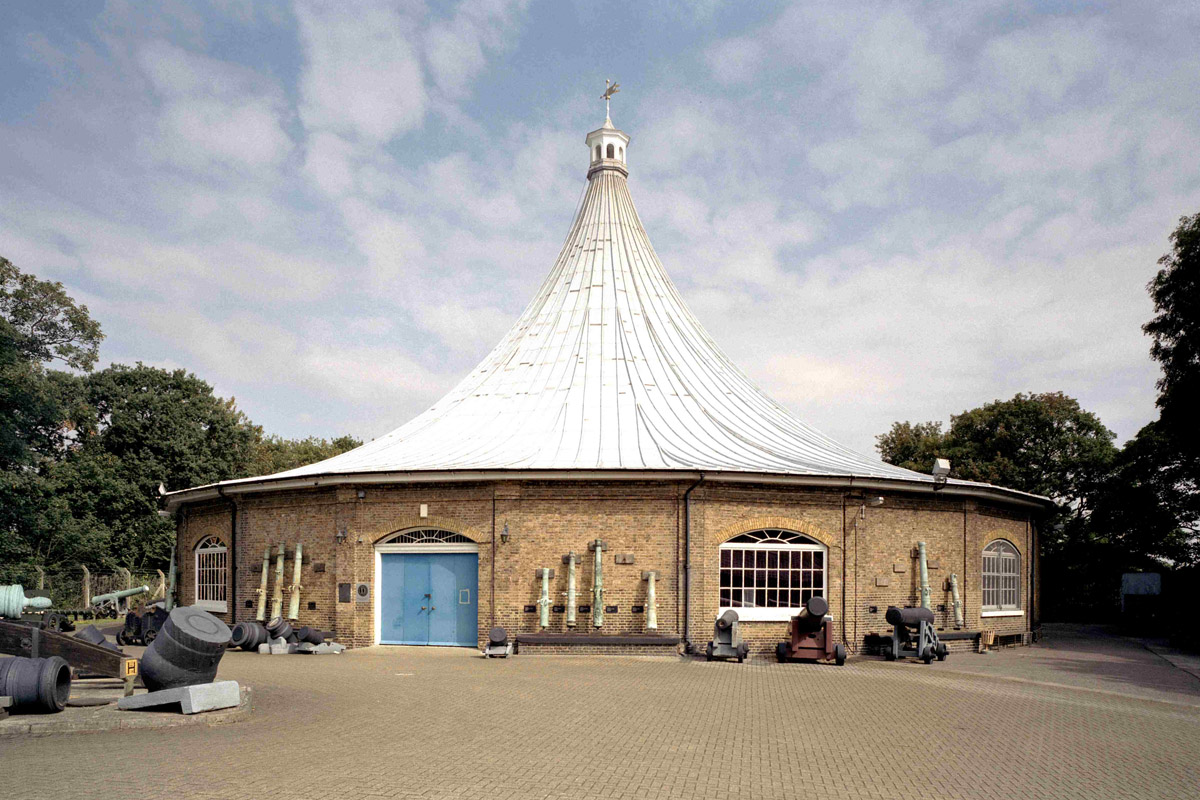
The caT
|
|
|
|
Posted by jessie.dazzle on
07-27-2009
|
|
fiogf49gjkf0d
Romy wrote :
"...The idea to have horn firing from roof is fine but in most of jurisdictions I think it will be prohibitive to build such a thing above roof. I need to check about it. To hide he horn in the living space is impossible of courses but in case of basement it does not take any useful space, which is not the case of ceiling firing horn..."
I was thinking that the upper level would "house" the horns; in other words, there would be a roof and walls to hide them from public view.
In the case of a normal ranch style home (one level, no basement) out in the burbs, the attic is wasted anyway; you could put it to use, and if necessary, modify the roof, letting the drivers live up under decorative little coupolas, complete with windows, curtains, and shutters. Here's a place that makes them ready-to-go :
http://www.centerhillbarns.com/center_hill_barns_cupolas.htm
Add some potted geraniums and the neighbors will love you.
In the case of a 2 or multi-level architecture, the horns would occupy what others would consider "living space", but with a bit of imagination, this space would not be lost; you could easily build shelving between the horns (audio storage?). In your case, all rooms other than the one where the system is are really only good for storage or sleeping, so you're not really loosing LIVING space.
jd*
|
|
|
|
Posted by Romy the Cat on
07-27-2009
|
|
fiogf49gjkf0d
 jessie.dazzle wrote: jessie.dazzle wrote: | In the case of a normal ranch style home (one level, no basement) out in the burbs, the attic is wasted anyway; you could put it to use, and if necessary, modify the roof, letting the drivers live up under decorative little coupolas, complete with windows, curtains, and shutters. Here's a place that makes them ready-to-go :
http://www.centerhillbarns.com/center_hill_barns_cupolas.htm. |
|
They do decorative appendix reedy to go? So, they do as well:
http://en.wikipedia.org/wiki/File:Masjid_Nabawi._Medina,_Saudi_Arabia.jpg
Anyhow, the idea is very cool I never thought about it.
 jessie.dazzle wrote: jessie.dazzle wrote: | | Add some potted geraniums and the neighbors will love you… |
|
Oh, do not even go there…!
There is another subject that makes me to think
A hypothetic midbass horn is not my lowers channels; I have and always will have a truly bass channel. I have an array of 10” that adore and I have in my storage a huge, probably 45-50 cub feet, sealed box with Aura 1808 (I would need two). I did not use that enclosure for years it might be interesting to know how my array will be compete with the sealed Aura.
Regardless of the outcome nether Aura or the array a large and I wonder how to hide them into obscurity. It always fascinated me that the midbass and bass sections might be reused, like to balding a bass section on the side of midbass. To do it in more or less time-aliened and integrated with real-east shall be a real pain in ass but no one said that it is imposable to invent something. Hypothetically a combined midbass and bass sections sound lucrative but what one shell do if the need different location at the given room layout?
Meanwhile I found a good way to explained to people what I am looking for. I tell them that I am a pianist and looking for a space for my mid-nigh practicing… Works very well…. The Cat
|
|
|
|
Posted by jessie.dazzle on
07-27-2009
|
|
fiogf49gjkf0d One other nice thing about floor or ceiling-mounting the lower-bass horns is that you wouldn't need such a huge living room; the space would be easier to load (sonically), and you'd have a much easier time finding an appropriate house.
Romy wrote :
"...it might be interesting to know how my array will be compete with the sealed Aura..."
I would think they might also compete with the mid-bass horns. The Auras can run up to 80, maybe 90Hz (you're probably going to say "60Hz max!!!"); would you really need to use the line arrays in the presence of a pair of mid-bass horns capable of a clean, honest 90Hz?
jd*
|
|
|
|
Posted by Romy the Cat on
07-27-2009
|
|
fiogf49gjkf0d
 jessie.dazzle wrote: jessie.dazzle wrote: | | I would think they might also compete with the mid-bass horns. The Auras can run up to 80, maybe 90Hz (you're probably going to say "60Hz max!!!"); would you really need to use the line arrays in the presence of a pair of mid-bass horns capable of a clean, honest 90Hz? |
|
I do not know, this is extremely hard to say what it might be. If I have my let say 45Hz horn then I envision that the LF channel (regardless what it might be: Auras or the Arrays) would be a low-passes at 25-40Hz. With the lowest octave everything is complicated, it is practically worthless to measure the things, and I do not think that any generic rules might be made. Generally the way how I approach it the sound shall be made for a full range, including the midbass horns. Then the individual LF sections needed be introduced… unit they start to take over the midbass hors’ lower knee. Unfortunately in reality the room modes from LF section begin to talk with output from midbass horn via room and it become mess, manageable mess but manageable only with practical actions rather than applications of theory.
I do not have a lot of practical experience to load relatively large rooms with midbass horns. But do not think that people who claim that they do have practical experience act consciously. In very many cases people dump the midbass “as is” in rooms, get whether they get and call it “right”. There are very few people, if any, who intentionally and creatively WORK with their midbass/lowbass in order to get the right sound. Of course I do not call the room EQ with a digital room correction devise as “working”… I for instance no where besides what you Jessie is trying to do I see anybody use an open-bottom LF section as a lover extension of closed-bottom midbass hors. Not to mention that I did not see a lot of interesting or properly made/used midbass hors out there… People mostly use midbass horns as flooding subwoofers and it is a totally different game… Rgs, Romy the Cat
|
|
|
|
Posted by Paul S on
07-27-2009
|
|
fiogf49gjkf0d The best hi-fi LF I have heard came from modified "pro" units (multi-15s) that had a LOT of power thrown at them; and furthermore, the system was "managed" by an... equalizer (albeit, done in real time...). This is not to speak of its FR performance, BTW, but just to share about the bass. But this was in a very large room, FWIW, one of the few big hi-fi rooms I've been in that was not a total disaster.
The worst LF (that really was LF...) I have heard has come from big DIY horns that just swamped the room (or the area...), much to the builders' delight; equally bad in large and medium-sized rooms.
I wonder how many people distinguish real LF from "bass", and I wonder how many people understand that implementation of LF might be parallel-but-different than "bass".
Ancient Stereophile founder JG Holt, who has spent a long lifetime recording orchestras, once likened the LF generated by a large orchestra's bass section alone to the sound and power of a semi pulling away from a curb. It is, in fact, a crapload of energy, and I am guessing it would take a lot of power and a lot of headroom to pull this off, even with a horn, if this were the sort of LF one were looking for. I am not sure that "horn gain" alone, without the power, would have the right effect for the "power band" of LF.
As a builder, I have noticed that many "lofts" I have been in have not been acoustically inert or "private" - at all - but the sound of parties and night time project building carried far and wide, throughout the buildings. I am not familiar with the old, east coast high-end masonary "apartments" that are reputed to be quiet between units. Old masonary buildings I have checked out in LA, San Diego and San Francisco have all transferred plenty of noise through floors and ceilings, AC systems, one way or another. I would recommend a +/- soildly constructed, free-standing structure on a large lot, for single-tenant occupancy. Still, any room that effectively "contains" all the sound is a real pisser to tailor.
Best regards,
Paul S
|
|
|
|
Posted by Romy the Cat on
07-27-2009
|
|
fiogf49gjkf0d
 Paul S wrote: Paul S wrote: | | The best hi-fi LF I have heard came from modified "pro" units (multi-15s) that had a LOT of power thrown at them; and furthermore, the system was "managed" by an... equalizer (albeit, done in real time...). |
|
They might do fine bass but they are not horns down to lower knee but rather direct radiators. There is nothing wrong with this but I have other views. Would like do not flood my upper bass the hyper-excurted drivers and with thermodynamic distortions of power SS amplification but rather I would like a horn to embrace what a very high quality, low-excursion, high tone, unstressed compression driver does.
 Paul S wrote: Paul S wrote: | | wonder how many people distinguish real LF from "bass", and I wonder how many people understand that implementation of LF might be parallel-but-different than "bass". |
|
And even less of them understand a difference between atmospheres pressure and tonal pressure.
 Paul S wrote: Paul S wrote: | | As a builder, I have noticed that many "lofts" I have been in have not been acoustically inert or "private" - at all - but the sound of parties and night time project building carried far and wide, throughout the buildings. I am not familiar with the old, east coast high-end masonary "apartments" that are reputed to be quiet between units. Old masonary buildings I have checked out in LA, San Diego and San Francisco have all transferred plenty of noise through floors and ceilings, AC systems, one way or another. I would recommend a +/- soildly constructed, free-standing structure on a large lot, for single-tenant occupancy. Still, any room that effectively "contains" all the sound is a real pisser to tailor. |
|
I am considering large city lofts but a few that I have seen do not have the mandatory for me concrete walls, floors and ceilings. In fact it is VERY hard to find them…. . The +/- solidly constructed, free-standing homes at very near suburbs is my primary area of interest. Unfortunately those building have idiotic, family-oriented floor plans with 700 sq feet of corridors and 7-10 rooms … Anyhow, I think this search might be a bit more complicated then I initially thought. The Cat
|
|
|
|
Posted by tuga on
07-28-2009
|
|
fiogf49gjkf0d Romy,
I know you are against a dedicated listening room but if you were to consider occupying the basement you could try an organic Erich Mendelsohn-like design that would incorporate the midbass horn and some recessed niches for media or other stuff you might want to store/display.
It could also be an efficient way of achieving a more subdued room personality.
Natural light could be achieved with a light well in the façade.
I've added a little sketch but this design is very much dependent of room configuration...
Cheers,
Ric
|
|
|
|
Posted by Romy the Cat on
07-28-2009
|
|
fiogf49gjkf0d Thanks, Ric.
At this point “specificity” of the sings positioning is not my primary interest but I rather am looking into strategic and conceptual solutions. For instance the Jessie’s idea to use attic and ceiling for midbass entry is very lucrative but how the hell bring 9’ horn with 2.5M mouth to an attic I have no idea, unless the attic is large enough to build it in there. Once again, at this point I just accumulate the thoughts, a sort of a pool of ideas from where I might fish something if I find a properly that I like otherwise. I find it useful to look at house and run a few thought out scenarios in my head.
What actually surprises me, and I never thought about it before, is that some people build very expensive and dedicated listening rooms in this houses and they practically never employ idea of integrated midbass horns. I am talking about the folks who spent $200K-$300K juts for building the rooms and then they end up in there with a pair of Kharmas, Wilsons, Martin Logans or Von Schweikerts. I find it as a tremendous waste and I kind of envy people who exercise chance to arrange real-estate in accordance with these objectives. If to build that listening room from scratch and it to presume the use of horn-loaded midbass and open-bottom lower bass then it is possible to come up with incredibly interesting opportunities…
The Cat
|
|
|
|
Posted by jessie.dazzle on
07-28-2009
|
|
fiogf49gjkf0d Are you sure you couldn't move your business to Detroit?
This will give you some idea of what's possible there :
http://www.roofcleaningbook.com/detroit_lofts.html
(15,000 Sq ft theater for $225,000)
jd*
|
|
|
|
Posted by jessie.dazzle on
07-28-2009
|
|
fiogf49gjkf0d Romy wrote :
"...the Jessie’s idea to use attic and ceiling for midbass entry is very lucrative but how the hell bring 9’ horn with 2.5M mouth to an attic I have no idea..."
You could do something like this :
1) Have the horns built (either right there in the living room or off site, it makes no difference), and have the builder include a large hook or attachment point at the exterior (back side) of the mouth at all four corners of each horn
2) Cut a hole in the ceiling a little larger than the size of the mouth for each horn
3) Now the tricky part : With pulleys located in the attic and the horn standing on its mouth and driver-end pointing up through hole, attach ropes to all four corners of the horn and, with the help of friends or paid workers, lift each horn vertically until flush with ceiling (don't forget to take photos!)
4) Secure horns to building's structure
5) Finish off the edge of the holes in the ceiling (I would not make the transition between mouth and ceiling completely seamless, as the horn will move and a crack will result; use a foam, rubber, or felt gasket)
Of course if the driver-ends are going to protrude past the roof of the hose, you'll want to have the roof modified first.
jd*
|
|
|
|
Posted by Romy the Cat on
07-28-2009
|
|
fiogf49gjkf0d Jessie’s comments about my idea to position midbass straight horns from basement, upper- firing and his warning that the horn will get converted into a giant garbage can made me to think. I did not think about it but it is a reasonable concern. Hypothetically it might be possible to inject in the beginning of the throat a nylon filter that would be catching the dirt but be acoustically transparent at LF…
This all opened for me a box of whole new thigh that I did not have before. Let pretend that I mount two straight vertical horns from ceiling up, in the way how Jessie depicted. A pair of 9” horn with a full 40-45Hz moth have a huge volume and sitting on a ceiling of let say 900 sq feet room the horns will act as strong chimneys. Sure it will not be any flow across the horn but the horns still will have much higher temperate at throats then at the floor of listening room.
So, this brings a few concerns. First is the over-drying of the horn’s cone. Second is the expediting of magnet demagnetizing from temperature (ALNOCO magnet of my 10/40-151 are especially valuable). And the third one is the horn constriction with a respect that horn will be working at relatively high temperature. The last one needs further explanation.
The ceiling-hanging horns most likely will not be as solid and heavy as basement-based upper- firing horns as therefore most possibly will be made from wood. The normal construction wood that people use contains 60-80% of moisture. With time goes by the horn dry out, get cracked and so on. So, if a ceiling-hanging horn will be made from wood then the wood needs to be somehow dehydrated. The people who use wood for sculpture use wood with 6% moisture. I wonder if it possible to cut the horn from 6% moisture wood and then seal it with polyethylene? Anyhow, it is all need to be well thought out…
The Cat
|
|
|
|
Posted by Paul S on
07-28-2009
|
|
fiogf49gjkf0d
Do I remember that old masonary "row houses" are common enough in certain old neighborhoods in some old eastern cities? I am thinking of the case where a given multi-story "house", sometimes with a basement, shares a thick wall with its neighbor but not floors/ceilings. Of course, I don't know whether/how sound might get out windows to disturb very close neighbors. But this still might be better than typical "loft" spaces that are often divided up with metal stud/drywall walls and shared corridors, elvators and stairwells.
Best regards,
Paul S
|
|
|
|
Posted by scooter on
07-28-2009
|
|
fiogf49gjkf0d
Hi Romy,
Won't work with row houses but....
Suburbs close to the city don't have much space around here, but often have a patch of useless lawn (unless you plan on a McMansion, whereby your house should cover every possbile square centermeter of land). This is my situation and I have thought about this for a while; perhaps you can make use of the lawn.
- If you will be listening on the ground floor, one option could be to put the horns outside and just bore a few holes into the house. You could approach the holes in several ways; just putting two holes in the house could be a problem for horn adjustments and (perhaps!) resale in certain situations. You might also think of putting holes where windows are or could be placed in the future. As you want to protect the horns from the elements and control temperature, you would need some type of addition, perhaps something that in the future could be converted into a sunporch with sliding doors put where the holes were and windows added.
- If you will be listening in the basement you could build an underground basement addition (like a cave), although from a practical perspective that could get a bit expensive to pay off the city "inspectors", dig the hole and pour the cement. You would need to build that extension a bit big to get around or if you want to change/adjust things; I think the above ground extension would be easier to change
|
|
|
|
Posted by tuga on
07-29-2009
|
|
fiogf49gjkf0d  Romy the Cat wrote: Romy the Cat wrote: | Jessie’s comments about my idea to position midbass straight horns from basement, upper- firing and his warning that the horn will get converted into a giant garbage can made me to think. I did not think about it but it is a reasonable concern. Hypothetically it might be possible to inject in the beginning of the throat a nylon filter that would be catching the dirt but be acoustically transparent at LF…
This all opened for me a box of whole new thigh that I did not have before. Let pretend that I mount two straight vertical horns from ceiling up, in the way how Jessie depicted. A pair of 9” horn with a full 40-45Hz moth have a huge volume and sitting on a ceiling of let say 900 sq feet room the horns will act as strong chimneys. Sure it will not be any flow across the horn but the horns still will have much higher temperate at throats then at the floor of listening room.
So, this brings a few concerns. First is the over-drying of the horn’s cone. Second is the expediting of magnet demagnetizing from temperature (ALNOCO magnet of my 10/40-151 are especially valuable). And the third one is the horn constriction with a respect that horn will be working at relatively high temperature. The last one needs further explanation.
The ceiling-hanging horns most likely will not be as solid and heavy as basement-based upper- firing horns as therefore most possibly will be made from wood. The normal construction wood that people use contains 60-80% of moisture. With time goes by the horn dry out, get cracked and so on. So, if a ceiling-hanging horn will be made from wood then the wood needs to be somehow dehydrated. The people who use wood for sculpture use wood with 6% moisture. I wonder if it possible to cut the horn from 6% moisture wood and then seal it with polyethylene? Anyhow, it is all need to be well thought out…
The Cat |
|
In my view, one other cause for concern would be the possible resonance of the ceiling if the ceiling structure is made wood.
I don't have any experience with all-wood houses but in buildings with masonry walls and wood beams+flooring low frequencies do induce quite a bit of vibration.
As for horn material, why not cast it in a 4 part fiberglass surface and, when assembled, thicken/dampen the outer side of the walls with something dense like plaster or maybe something lighter like papier-mâché?
The fiberglass would definitely give an interesting random-textured surface to the inside of the horn but it would also intensify the "chimney" effect. You could always remove the fiberglass panels, though, after the papier-mâché had dried.
Cheers,
Ric
|
|
|
|
Posted by Romy the Cat on
07-29-2009
|
|
fiogf49gjkf0d The more I looking and thinking about the pool of available idea and properties then more I come to a “ridicules” conclusion that I most likely will not find what I need and what I like. The point is that if I combine my requirement for not suspended floor, solid concrete walls, absence of neighbors, 900 sq feet of a single room, ability to do capital change in the building, proper neighborhood and many other non-audio requirement then I do not think suck a place will be easy to find. It is not to mention that whatever I might find I will be accommodating to the existing half-ass solution to what I need.
Last night I discussed this with a friend of mine and he pitched an interesting idea. He proposes instead of looking a relatively large house that would be able to convert a few rooms into one 800-1000 sq feet room to look for a small and inexpensive house on a larger lot where I would be able to build my own attached living room. Actually, the more I think about this idea that more it sound sane to me. I might find a nice little cute house of let say 1000 sq feet, then cut one wall off and attach my 1000 sq feet living/listening room. To render the projects like this will be not very expensive as it will be no pluming, no basement and no other things involved. Furthermore if it will be the room that is made according to my rules then it will be perfectly accommodated to what I need, with properly constructed amendments that I would like to have (which might even allow me to have the room itself smaller). It would be much ease to fine such a convertible house, I just need to do some research with zoning regulation and building permits. We were sitting and brainstorming what might be done and it appeared to me that it might be a VERY good direction to go. The room itself is a part of house and even for resale it might be hold own merit. For instance the side midbass horns entry into the room in case I need to abandon this property might be easily converted into side windows and sold to normal people…
Ok, now I need to find an architect-girlfriend. :-)
The Cat
|
|
|
|
Posted by jessie.dazzle on
07-29-2009
|
|
fiogf49gjkf0d One easy way around any zoning issues with an added on room is to find a house with a large garage, knock down the garage and build the new space on the existing concrete pad. That way you won't have to worry about easements and how close you are to the property line, because the space you'd use has already been approved.
A custom built space remains my first choice; among many other benefits, I imagine it would allow the large horns to be located on the same wall, and firing in the same direction as the MF & HF horns. If theft is a concern, a custom addition could easily be made quite theft-proof. Give it a flat roof and you automatically gain outdoor living space.
Regarding heat finding its way up to the driver of a ceiling-mounted vertical horn: I don't yet have a good answer for that one. However, heat accumulating from the sun striking the roof of the attic would seem far more likely to exceed anything that would waft up from within the listening space. This had occurred to me; you'd definitely want a good pair of attic fans.
jd*
|
|